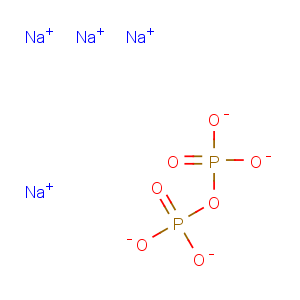Title: Tetrasodium Pyrophosphate
CAS Registry Number: 7722-88-5
Synonyms: TSPP; pyro; sodium pyrophosphate
Molecular Formula: Na4O7P2
Molecular Weight: 265.90
Percent Composition: Na 34.58%, O 42.12%, P 23.30%
Line Formula: Na4P2O7
Literature References: Available alkalinity as Na2O 4.4%, total alkalinity 22.7%. Produced by molecular dehydration of dibasic sodium phosphate at 500°: Bell,
Inorg. Synth. 3, 98 (1950).
Properties: Crystals, d 2.534. mp 988°. Soly in water (g/100 ml) at 0°: 2.61; at 25°: 6.70; at 100°: 42.2. pH of a 1% soln = 10.2. Hydrolyzes to orthophosphate in aq soln, but the rate of hydrolysis is much slower than for the more acid pyrophosphate. No noticeable hydrolysis within 60 hrs at 70°: Bell,
Ind. Eng. Chem. 39, 136 (1947).
Melting point: mp 988°
Density: d 2.534
Derivative Type: Decahydrate
Properties: Crystals, d 1.82. mp 79.5°. Slight efflorescence in dry air. Soly in water (g/100 ml) at 0°: 3.16; at 20°: 6.23; at 25°: 8.14; at 60°: 21.83; at 80°: 30.04. pH of 1% soln at 25° = 10.2. Insol in alc.
Melting point: mp 79.5°
Density: d 1.82
CAUTION: Potential symptoms of overexposure are irritation of eyes, skin, nose, throat; dermatitis.
See NIOSH Pocket Guide to Chemical Hazards (DHHS/NIOSH 97-140, 1997) p 304.
Use: In cleansing compds, oil-well drilling, water treatment, cheese emulsification, as general sequestering agent, to remove rust stains, as ingredient of one-fluid ink eradicators, in electrodeposition of metals.

